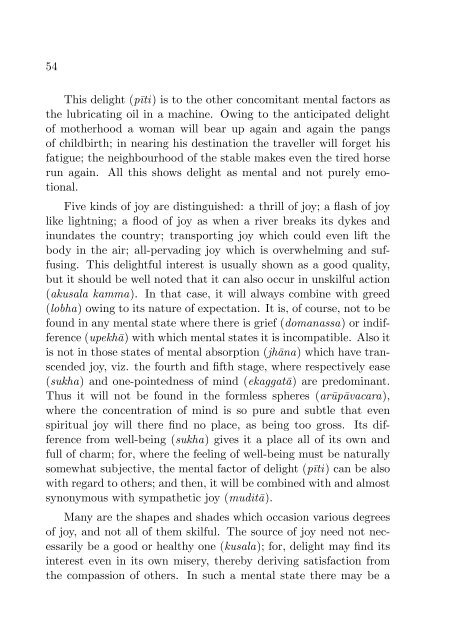Agony and Ecstasy
A comparative study of the five hindrances, together with the five states of concentration or mental absorption.
A comparative study of the five hindrances, together with the five states of concentration or mental absorption.
Create successful ePaper yourself
Turn your PDF publications into a flip-book with our unique Google optimized e-Paper software.
54<br />
This delight (pīti) is to the other concomitant mental factors as<br />
the lubricating oil in a machine. Owing to the anticipated delight<br />
of motherhood a woman will bear up again <strong>and</strong> again the pangs<br />
of childbirth; in nearing his destination the traveller will forget his<br />
fatigue; the neighbourhood of the stable makes even the tired horse<br />
run again. All this shows delight as mental <strong>and</strong> not purely emotional.<br />
Five kinds of joy are distinguished: a thrill of joy; a flash of joy<br />
like lightning; a flood of joy as when a river breaks its dykes <strong>and</strong><br />
inundates the country; transporting joy which could even lift the<br />
body in the air; all-pervading joy which is overwhelming <strong>and</strong> suffusing.<br />
This delightful interest is usually shown as a good quality,<br />
but it should be well noted that it can also occur in unskilful action<br />
(akusala kamma). In that case, it will always combine with greed<br />
(lobha) owing to its nature of expectation. It is, of course, not to be<br />
found in any mental state where there is grief (domanassa) or indifference<br />
(upekhā) with which mental states it is incompatible. Also it<br />
is not in those states of mental absorption (jhāna) which have transcended<br />
joy, viz. the fourth <strong>and</strong> fifth stage, where respectively ease<br />
(sukha) <strong>and</strong> one-pointedness of mind (ekaggatā) are predominant.<br />
Thus it will not be found in the formless spheres (arūpāvacara),<br />
where the concentration of mind is so pure <strong>and</strong> subtle that even<br />
spiritual joy will there find no place, as being too gross. Its difference<br />
from well-being (sukha) gives it a place all of its own <strong>and</strong><br />
full of charm; for, where the feeling of well-being must be naturally<br />
somewhat subjective, the mental factor of delight (pīti) can be also<br />
with regard to others; <strong>and</strong> then, it will be combined with <strong>and</strong> almost<br />
synonymous with sympathetic joy (muditā).<br />
Many are the shapes <strong>and</strong> shades which occasion various degrees<br />
of joy, <strong>and</strong> not all of them skilful. The source of joy need not necessarily<br />
be a good or healthy one (kusala); for, delight may find its<br />
interest even in its own misery, thereby deriving satisfaction from<br />
the compassion of others. In such a mental state there may be a

















